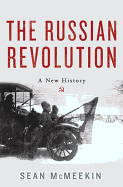
The year 2017 marks the centennial of the Russian Revolution, a convulsion of political violence, anarchy and terror that ended the 300-year reign of the Romanovs and shaped the remainder of the 20th century. This epoch of uprisings has long been analyzed and mythologized, though it took the fall of the Soviet Union to tell its whole story. In The Russian Revolution: A New History by Bard College history professor Sean McMeekin, original archival research shines much-needed light on events that still cast a long shadow over modern geopolitics.
McMeekin sets the stage of a tsarist Russia ripe for revolution, though not necessarily destined for one. This ancient autocracy had been shaken in 1905 after a humiliating defeat in the Russo-Japanese War, but the state was rapidly industrializing. A prolonged period of peace might have prevented what befell Nicholas II. Instead, the tsar's decision to side with Serbia in 1914, thereby kicking off World War I, was the catalyst of his own demise.
McMeekin emphasizes revolutionary Russia as a nation at war, a simple fact he considers overlooked in other histories. In fact, the plotters of the February Revolution in 1917, which initially overthrew the tsar, were bolstered by anti-German, somewhat pro-war sentiment; they feared that the tsarina (who was German by birth) was part of a cabal seeking peace with Germany. It was Vladimir Lenin (with generous German support) and his extremist Bolsheviks who overthrew the provisional government by force in October 1917, setting up years of disastrous civil war. The Russian Revolution tells this tumultuous account in an accessible, engaging narrative with sometimes day-by-day or even hour-by-hour detail. --Tobias Mutter, freelance reviewer

